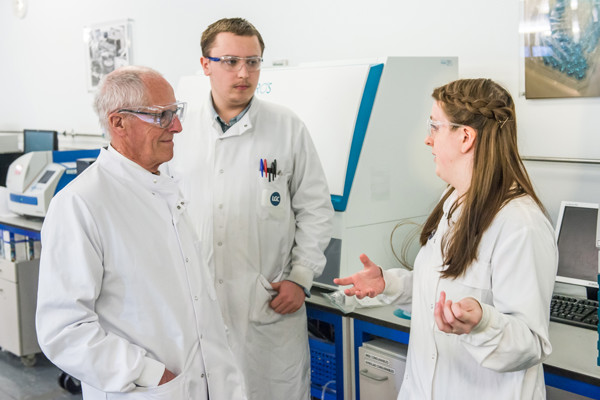Are apprenticeships the future for science?

This week marks the 11th annual National Apprenticeship Week, a time for organisations across the country to celebrate the success of apprenticeships and encourage more people to participate in their schemes.
Apprenticeships provide an alternative to young people who either don’t wish to or are unable to attend university, and in some cases, they can complement university studies.
These schemes give students the chance to learn on their feet in real work environments, while earning money and achieving professional qualifications. And evidence shows that they work. Ninety-two percent of apprentices feel that their apprenticeship has had a positive impact on their career prospects. But there’s still a way to go in the science community to providing these opportunities to future scientists.
In the last academic year, there were nearly 500,000 apprenticeships. Yet fewer than 300 of those are in science, which accounts for less than one percent of all apprenticeships. This limits paths to those who’d like to pursue careers in science, and if we want the best and brightest of a diverse workforce pushing science into the future, this gap needs to be addressed.
As we’ve learned through our own accredited apprenticeship programme, students welcome the opportunity to get on-the-job training and experience in a professional environment. Many of our apprentices even go on to get hired as qualified scientists with LGC.
If you’re considering pursuing a science apprenticeship, don’t just take our word for it: hear it straight from one of our own apprentices, Krzysztof, who helped us understand what his apprenticeship means to him.
What is your role at LGC?
“I’m an apprentice at LGC, completing a Level 4 Higher Apprenticeship in Chemical Science for Industry and currently, I work in the Large Molecule Bioanalysis department as an Assistant Scientist. I also attend an education program run by CSR, who specialise in training apprentices and work with LGC on their apprentice program. Out of this program I will also receive a Level 4 Laboratory and Associated Technical Activities qualification.
What are some of your day-to-day tasks?
“My day-to-day job consists of quality control checking proformas, carrying out assays, maintaining the lab and even handling data through Watson, software we use to analyse data. I’ve learned a lot of things at LGC, including how to take care and maintain the equipment we use and how the samples are processed through the facility, from delivery to the project management in the form of data. I’m still learning how to completely understand, set up and carry out an assay. I have some experience in carrying out assays, but I haven’t yet gotten the hang of how to set one up. I’m learning that now. Also, I’m learning how to write professional reports, including where to look to get the information and data to write one.”c
How do you feel about your apprenticeship?
“Overall I don’t think it is possible to be any happier with the choice of signing up for this apprenticeship. It has been an enjoyable, fun and incredibly educational time for me at this company as an apprentice. I think what I like the best at LGC is that after successfully completing the course, you get a very high chance of employment as a professional scientist, so nothing you learn here is ever going to waste.”
